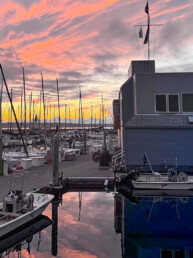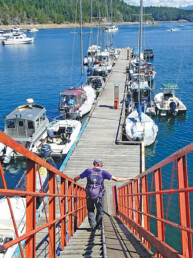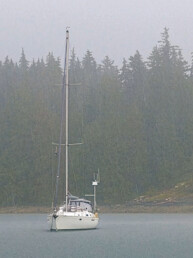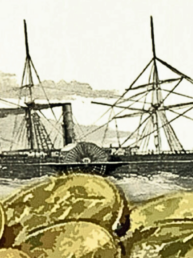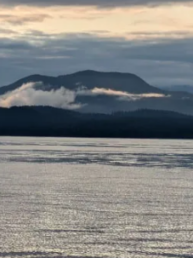The Tribal Canoe Journey is an annual tradition of traveling on ancestral waterways and in early August 2024, the focus of the journey was on youth as participants paddled to Puyallup.
The whole point of this Youth Journey is to teach our children, with adults and the Elders working with the youth to train them to be in the leadership position. It doesn’t eliminate any canoe families from participating. It puts the focus on training our youth.
The youth journey is an opportunity for elders to impart their knowledge, for adults to guide and support, and for our youth to step confidently into roles of leadership. This will assist in ensuring that the culture is continued on through future generations.
Each year, coastal tribes from Canada, Washington and Oregon send their canoes from their reservation to the hosting tribe which changes annually. We leave depending on distance to the host tribe in order to land there on the same day. We camp at a different territory almost nightly, asking permission from those hosting us to come ashore. They feed us and our ground crew has our campsite prepared for us ahead of time. The next morning we paddle to the next destination taking the hosting tribe canoes with us, gathering more at each stop along the way. Indigenous people from around the world have joined in the Journey sharing their culture’s songs and dances from the East Coast tribes to New Zealand and Hawaii.
There have been about 80-90 canoes in the past at final landing and every tribe does protocol asking permission to come ashore one by one as we have always done. Then each canoe family shares songs and dances from the furthest traveled to the closest which usually takes about 5 days going all day and night. We camp at the host tribe the remainder of protocol.
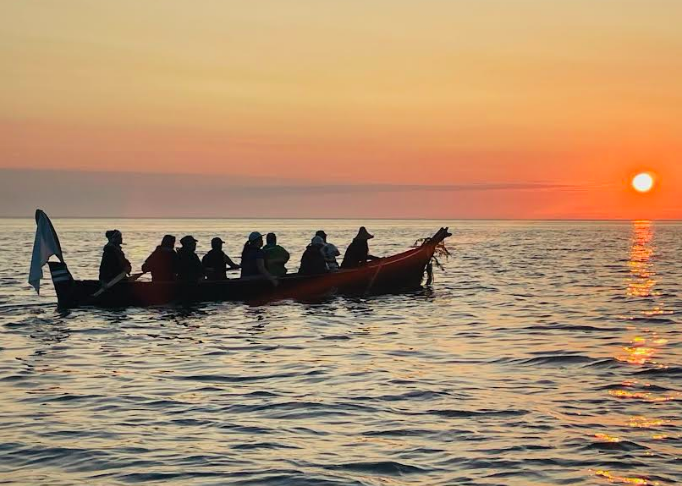 The Canoe Journey to me is not just about what we do while we’re here, it is a way of life. We are taught teamwork, working as a unit with each position in the canoe having a responsibility with integrity. You learn each role in each position before you learn to skipper. You pull your own weight and if you don’t we all can feel it. We paddle in sync. Every individual is needed and important for safety of the crew. We are family. We uplift and support each other and we respect the land and the water we travel on.
The Canoe Journey to me is not just about what we do while we’re here, it is a way of life. We are taught teamwork, working as a unit with each position in the canoe having a responsibility with integrity. You learn each role in each position before you learn to skipper. You pull your own weight and if you don’t we all can feel it. We paddle in sync. Every individual is needed and important for safety of the crew. We are family. We uplift and support each other and we respect the land and the water we travel on.
Many people are here for healing. The sense of community and unity is a source of strength along with the traditional songs and dances for those who may not have that outside of Journeys. This event is totally drug and alcohol free and supports those in recovery as well as those grieving or just going through hard times. Practicing our cultural traditions gives us a way to stay on track for those who may have gone down the wrong path.
We are focusing on teaching our youth the ways we were taught, the old ways; respecting our elders, putting them first, feeding them first. Leading by example. Teaching them why we do things a certain way and the spiritual significance behind it. Doing protocol in the ways our ancestors did, asking permission to come ashore, identifying ourselves and why we came with paddles up to signify peace. Dancing in sync, beading and weaving regalia, caring for our canoe and listening to your elders are among many lessons learned along the way. “It takes a village to raise a child” is truly displayed by our crew and the Native community as a whole.
Traditional songs and dances are shared in full regalia by each tribe, passed down from generations and thanks is given with gifts from near and far. A core group of our crew attend each year while new people join in the experience as they are able to. We reunite with old friends and meet new crew members annually. The experience leaves any newbie with lifelong lessons and fellowship.
So much goes into preparations for the journey whether is be monetarily, hand crafted gifts, time, and coordinating for each position be it pullers, ground crew, or support. We eat together, camp together, pull (paddle) together, grieve together and pray together. The sense of community is overwhelming.
It’s learning, it’s teaching, it’s healing…it’s spiritual. It’s hard work, it hurts sometimes but it’s so rewarding. It’s a celebration of practicing and passing on our traditional ways for our ancestors and future generations. It’s traveling our ancient waterways the way we always have. The water is how we get our food and visit relatives. The sea is our country. We travel it to visit and share with other Native Nations. That’s what we’re doing, what we’ve always done. It’s not just about the destination, it’s the Journey. It’s our way of life.
Find out more at www.puyalluptribe-nsn.gov


